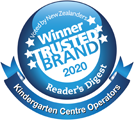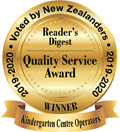LATEST STORIES
Sustainability at Te Whariki
We have been busy since May with our Centre inquiry into sustainability. This inquiry was led by our Sustainability Warrior, Morag, following the successful implementation of our community Pātaka Kai Te Whāriki, which stands proudly by our front door and is highly utilised by the community. Our three key areas to research included Social & Cultural, Environmental, and Economic sustainability. Working groups were formed to inquire, make links to key documents and philosophy, and create and implement actions towards sustainability.
We started with a survey in May asking our whānau what they thought we were doing well and how we could improve our practices within our key areas. This was followed by a presentation at our centre’s Matariki celebration with whānau. The Social & Cultural group focused on making links to our local curriculum by nurturing growth within our community. Starting with a survey has led to staff preparing for Parent Information nights. Another outcome from this inquiry has been the implementation of a more meaningful and culturally relevant celebration for children and whānau transitioning through the centre. This has strengthened not only communication but also a shared sense of belonging.
The Environmental Sustainability group’s key focus was on recycling. We enjoyed a visit from our local ReDiscover Hub, which taught our tamariki ways to recycle. This led to our community embracing our soft recycling initiative by providing a collection point at the centre. Parents have commented that they have never recycled as much before, which is a testament to how easy it can be when the community becomes engaged in the process. Our efforts in this area of sustainability have been recognised by The Lincoln Envirotown Trust. As part of the 2024 Selwyn Responsible Business Awards, we were presented with the Gold Award in recognition of ‘Environmentally Sustainable Business Practices & Community Engagement’. We have also created a garden area with the goal of supplementing our kitchen and minimising food waste by adding a worm farm. This is now a regular on-site excursion enjoyed by all.
Our Economic Sustainability group’s significant impact has been the implementation of using washable pink cloths instead of paper towels to clean nappy mats. Another saving realised is our reduced paper use by introducing personalised scrapbooks for children when they just want to ‘doodle’, along with sharing consumables between rooms like dry ingredients and paint. The results of our inquiry have led to successful and ongoing collaborative efforts from all involved for the benefit of our entire learning community.






